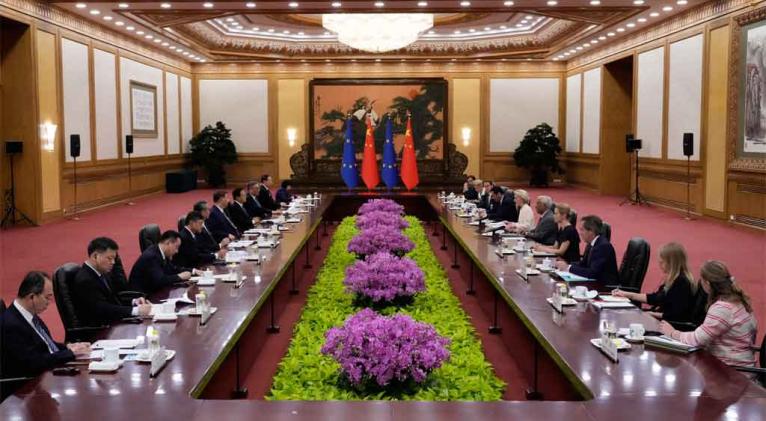China-EU Summit Addresses Bilateral Ties, Geopolitics, and Global Landscape
especiales

The 25th China-European Union (EU) Summit convened today in Beijing, focusing on bilateral relations, geopolitical challenges, economic and trade ties, and the complex global landscape.
Chinese Premier Li Qiang co-chaired the meeting alongside European Council President António Costa and European Commission President Ursula von der Leyen.
Premier Li emphasized that over the past 50 years, since the establishment of diplomatic relations, China and the EU have developed a stable partnership that has yielded tangible benefits for both sides.
According to Li, history demonstrates that when mutual respect, understanding, and openness prevail, cooperation between the two parties progresses and produces shared benefits. Conversely, when relations become distant or are disrupted, collaboration stalls and both sides are negatively affected.
“China and the EU share broad common interests and have no fundamental conflicts. Despite changes in the international landscape, cooperation should remain the core of the bilateral relationship and partnership its defining feature,” he said.
Li also noted that in a rapidly evolving and turbulent global environment, it is increasingly important for both parties to strengthen their collaboration. He asserted that if China and the EU uphold free trade, international economic and commercial activity will continue to thrive.
Earlier in the day, Chinese President Xi Jinping met with Costa and von der Leyen and called for stronger cooperation at what he described as a critical historical juncture.
Ahead of the summit in Beijing, von der Leyen stated that the meeting presented an opportunity to “move forward and rebalance our relationship.”
Niclas Kvarnström, Director General for Asia and the Pacific at the European External Action Service, noted that Europe’s two main concerns are the Russia-Ukraine conflict and the structural trade imbalance with China.
The summit took place amid renewed trade tensions, following the EU’s announcement of new sanctions affecting Chinese companies and financial institutions.
Experts noted that the ongoing Russia-Ukraine conflict, Europe’s uncertainty regarding U.S. security guarantees, and tariffs imposed under the Trump administration have contributed to the EU’s reassessment of its policy toward Beijing.
However, the EU and China remain engaged in a trade dispute involving mutual accusations, export restrictions, and tariffs on key products.
Over the past five decades, the two sides have established more than 70 mechanisms for consultation and dialogue across various areas, including politics, economy and trade, culture, science and technology, energy, and the environment.














Add new comment